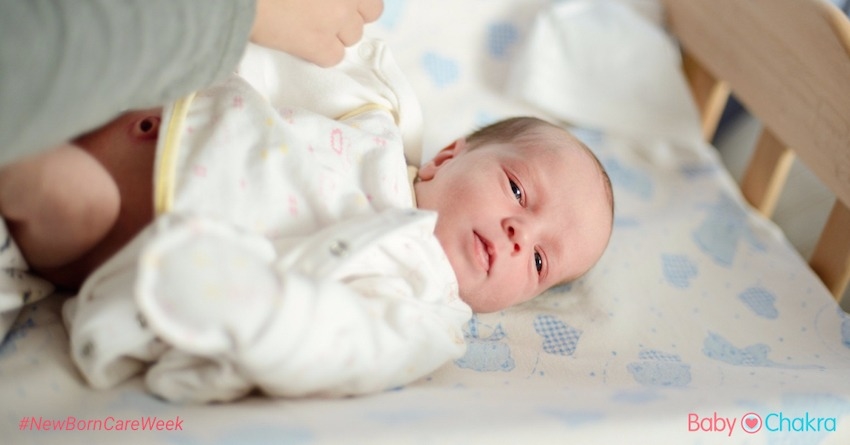
Welcome home, baby: Caring for your newborn once s/he’s home
18 Oct 2016 | 5 min Read
Baby Chakra
Author | 501 Articles
After delivery and a brief stay at the hospital, you and your family will be ready to welcome your little one home. While you may be relieved that you are home, it’s natural to have so many questions regarding the newborn’s behavior and body. With too much of advice coming from friends and relatives, it’s natural for new parents to be confused. Here’s a great guide to taking care of your newborn by Dr R. K. Anand from his popular book, A Guide to Childcare.
In case of a normal delivery, you are likely to be discharged from the hospital after about 3 days. If you’ve had a Caesarean delivery or if you or your baby had any problem, the doctor may ask you to stay a bit longer.
Breastfeeding: Once home, do not blindly follow the instructions of any relative or health worker. Do not let them make you anxious that you may not have enough breast milk. You and your baby share a bond, and your body will produce the nourishment she needs.
Crying: Do not hesitate to pick your child up when the cries. It is most important for a baby to have a feeling of security after birth. Crying is often a signal that she needs something. Don’t worry about disciplining the child at this stage. I am in favour of discipline but it can come later, when the child is older and is assured that she is loved and wanted.
Sometimes, a baby who was quiet in hospital may start crying unduly on reaching home. Perhaps she needs time to adjust to her new surroundings. She is likely to settle within 2 to 3 days. If you are worried that your baby is crying because you are not producing enough milk for her, watch the colour of her urine. If she is getting only your milk and keeps passing light-coloured urine, it is a sure sign that she is getting enough milk.
The umbilical cord starts drying up within the first week and separates towards the end of the first week or in the second week. If you find blood oozing from the cord, report it to a doctor. It should be kept clean and dried properly after the bath. No need for anything to be applied on it. If your doctor gives you spirit to clean the skin around the cord, use it 3 to 4 times a day.
It is important to keep the skin dry. Do not use any binder to cover the cord. Also, do not allow urine to come in contract with the cord. When the cord falls off, a drop or two of blood may be noticed around the base. This is normal. If you notice pus at the base of the cord or redness of the skin around the navel, bring it to the attention of your doctor to rule out infection of the cord. If required, the doctor may prescribe some medicine.
Urine and Bowel Movements: Meconium is the first stool that the baby produces. It is dark green and sticky. Most babies pass meconium within 12 hours of birth. The doctor should be informed if the baby does not pass meconium within 24 hours.
Some babies first pass a yellow or greyish white meconium plug, followed by the typical meconium. It changes to greenish-brown after 2 or 3 days. Gradually, over the next few days, it changes to greenish yellow and then to the so called normal, orange yellow loose stool of an exclusively breastfed child.
These motions are often quite frequent.
Your newborn baby may pass a motion after each feed or after every hour. At times, the motions are watery, may come out with force and contain mucus. At times, they may also be green, As long as the child is being given only mother’s milk and is thriving well, such frequent motions are normal.
On the other hand, some babies may pass a motion every 5 to 6 days, but the motions are soft, not hard. This is also normal and there is absolutely no need to give purgatives or use a suppository.
Most babies would pass urine within 24 hours after birth. Some may do so a little later. But special note has to be made if your baby has not passed urine within the first 36 hours.
Straining or crying a little before passing urine is normal. The stream of urine should be checked. An interrupted stream should be brought to the notice of your doctor, who may ask for a urine examination. Similarly, as long as the stools are not hard, straining before passing a motion is also normal.
It’s natural to be scared when handling a little baby. But the human body has an amazing ability to adjust to its surroundings. Your baby just needs to be clean, well-fed and showered with cuddles.
A


Related Topics for you
Suggestions offered by doctors on BabyChakra are of advisory nature i.e., for educational and informational purposes only. Content posted on, created for, or compiled by BabyChakra is not intended or designed to replace your doctor's independent judgment about any symptom, condition, or the appropriateness or risks of a procedure or treatment for a given person.
